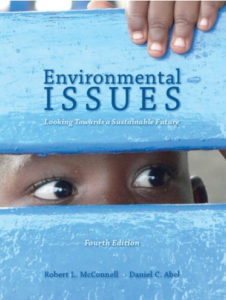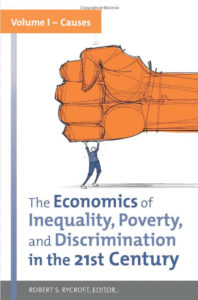 Social Skills Deficits in Students With Disabilities: Successful Strategies From the Disabilities Field
Social Skills Deficits in Students With Disabilities: Successful Strategies From the Disabilities Field
By UMW Associate Professor of Education Helen Nicole Frye Myers
This text targets anyone who works with children with disabilities, including parents, teachers, counselors, and psychologists. The book looks at the effects of the social challenges often faced by youngsters with special needs. Counselors and special educators along with a psychologist and an occupational therapist weigh in on how to support development of these important skills and share with readers the strategies that have worked for them.
Rowman & Littlefield Education, February 2013
 Environmental Issues: Looking Towards a Sustainable Future, Fourth Edition
Environmental Issues: Looking Towards a Sustainable Future, Fourth Edition
By UMW Professor Emeritus of Geology Robert L. McConnell and Coastal Carolina University Associate Professor of Marine Science Daniel C. Abel
The authors of this fourth-edition text focus on using real-world environmental issues to foster the development of mathematical skills and critical thinking. Divided into seven sections that examine topics like climate change, population and migration, and threats to the ecosystem, the book tackles the complex issues of sustainability on local, regional, and global levels.
Pearson Learning Solutions, December 2012
 The Economics of Inequality, Poverty, and Discrimination in the 21st Century
The Economics of Inequality, Poverty, and Discrimination in the 21st Century
Edited by UMW Professor and Chair of Economics Robert S. Rycroft
Many UMW faculty and alumni contributed to this two-volume, 32-chapter interdisciplinary text, which examines the causes of poverty and inequality.
In it, prominent economists, sociologists, political scientists, philosophers, and lawyers from the U.S. and Canada tackle the question of whether poverty is propelled by societal institutions or by the personal choices of low-income individuals. They address the ways in which economic inequality affects societal mobility, exists in the U.S., affects Americans compared to those in other countries, and is balanced by social and economic policies.
In the introduction, Rycroft points to New York City’s 2011 Occupy Wall Street movement and subsequent similar developments in more than 80 countries, including Ireland, Israel, Australia, and South Korea.
“Even in these relatively prosperous societies there is a great deal of discomfort about whether abundance is being shared fairly,” Rycroft writes. “I think this book appears at the right time.”
Contributing experts from UMW include Rycroft, Associate Professor of Economics Shawn Humphrey, College of Business Associate Dean for Operations and Outreach Kimberly Kinsley, and Associate Professor of Sociology and Anthropology Kristin Marsh.
Stanford University Ph.D. candidate and entrepreneur Christine Exley ’09 (read more about Exley on page 59) and Bridgewater State University Assistant Professor of Economics Matthew Parrett ’98 also weigh in, along with a former UMW adjunct faculty member and two spouses of UMW faculty.
Praeger, March 2013
